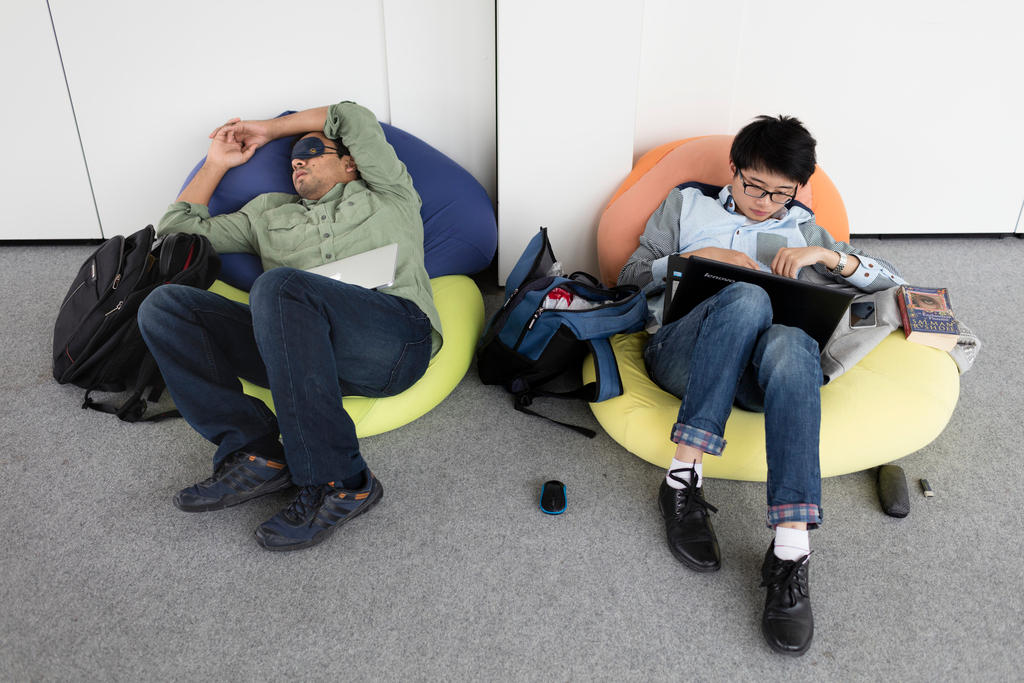You can learn a new language when deeply asleep

It is possible to learn new vocabulary in a foreign language during district phases of deep sleep – and to retrieve it unconsciously when you wake up, University of Bern researchers have found.
People have long wondered whether “unproductive” sleep time could be used for learning, for example, a new language. But to date, sleep research has focused on the consolidation of memories that have been formed while you are awake, rather than actual sleep learning.
It is known, however, that sleep helps the learning process in that information learned during the day is replayed in the sleeping brain. This strengthens the still-fragile memory traces and embeds the new information into the learner’s existing store of knowledge.
Katharina Henke, Marc Züst und Simon Ruch of the Institute of Psychology and of the Interfaculty Research Cooperation “Decoding Sleep”External link at the University of Bern wanted to know if the same would apply to new information coming in while someone is asleep.
“These investigators now showed for the first time that new foreign words and their translation words could be associated during a midday nap with associations stored into wakefulness,” a University of Bern statementExternal link said.
The results have been published in the scientific journal Current Biology.External link
‘Up-states’
Researchers submitted 41 sleeping participants to a test to see if their brains would acquire vocabulary from a made-up language during their so-called “up-states”, when brain cells are active. In deep sleep, brain cells are commonly active for a short period of time before becoming briefly inactive (during a down-state). The two states alternate about every half second.
The semantic associations between words in an artificial language played during sleep and their German translations were only encoded and stored if the second word of the pair was repeatedly played during an up-state, researchers found.
For example, if a sleeping person had heard the word pairs “tofer = key” and “guga = elephant”, they were better able to categorise whether the sleep-played foreign words denominated something large (“guga”) or small (“tofer”) after waking. The total success rate was 60%.
“It was interesting that language areas of the brain and the hippocampus – the brain’s essential memory hub – were activated during the wake retrieval of sleep-learned vocabulary because these brain structures normally mediate wake learning of new vocabulary,” said Züst, co-first-author of the paper.
“These brain structures appear to mediate memory formation independently of the prevailing state of consciousness – unconscious during deep sleep, conscious during wakefulness”.
Sleep theory
In addition to possible practical uses, this new evidence for sleep learning challenges current sleep and memory theories, the University of Bern said. The notion of sleep as an encapsulated mental state in which we are detached from the physical environment is no longer tenable, it added in its statement.
“In how far and with what consequences deep sleep can be utilised for the acquisition of new information will be a topic of research in upcoming years,” commented research group leader Henke.
In particular, it remains to be determined whether relational vocabulary acquisition during sleep would boost subsequent wake learning of the same vocabulary, the researchers noted in the study.
Decoding sleep
Henke’s research group is part of the Interfaculty Research Cooperation “Decoding Sleep: From Neurons to Health & Mind” (IRC)External link, interdisciplanry project financed by the University of Bern, Switzerland. It involves 13 research groups in medicine, biology, psychology, and informatics. The aim is to gain a better understanding of the mechanisms involved in sleep, consciousness, and cognition.

In compliance with the JTI standards
More: SWI swissinfo.ch certified by the Journalism Trust Initiative


You can find an overview of ongoing debates with our journalists here. Please join us!
If you want to start a conversation about a topic raised in this article or want to report factual errors, email us at english@swissinfo.ch.